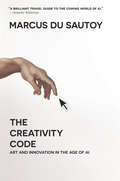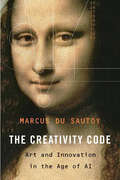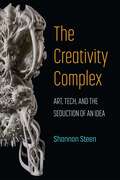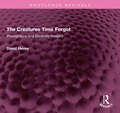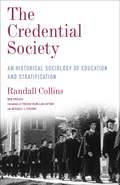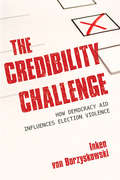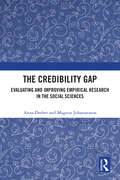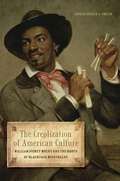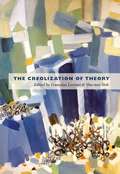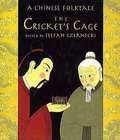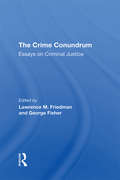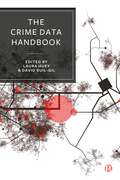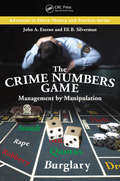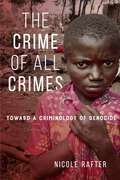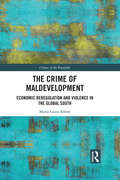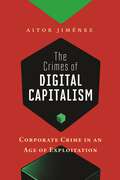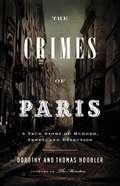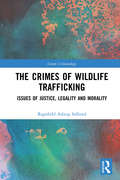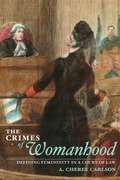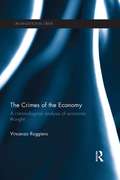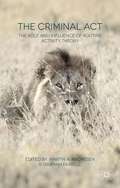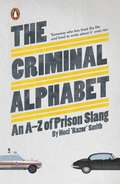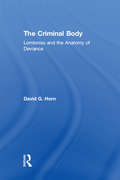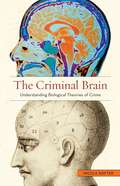- Table View
- List View
The Creativity Code: Art and Innovation in the Age of AI
by Marcus Du SautoyMost books on AI focus on the future of work. But now that algorithms can learn and adapt, does the future of creativity also belong to well-programmed machines? To answer this question, Marcus du Sautoy takes us to the forefront of creative new technologies and offers a more positive and unexpected vision of our future cohabitation with machines.
The Creativity Code: Art and Innovation in the Age of AI
by Marcus du SautoyMost books on AI focus on the future of work. But now that algorithms can learn and adapt, does the future of creativity also belong to well-programmed machines? To answer this question, Marcus du Sautoy takes us to the forefront of creative new technologies and offers a more positive and unexpected vision of our future cohabitation with machines.
The Creativity Complex: Art, Tech, and the Seduction of an Idea
by Shannon Steen“Creativity” is a word that excites and dazzles us. It promises brilliance and achievement, a shield against conformity, a channel for innovation across the arts, sciences, technology, and education, and a mechanism for economic revival and personal success. But it has not always evoked these ideas. The Creativity Complex traces the history of how creativity has come to mean the things it now does, and explores the ethical implications of how we use this term today for both the arts and for the social world more broadly. Richly researched, the book explores how creativity has been invoked in arenas as varied as Enlightenment debates over the nature of cognition, Victorian-era intelligence research, the Cold War technology race, contemporary K-12 education, and even modern electoral politics. Ultimately, The Creativity Complex asks how our ideas about creativity are bound up with those of self-fulfillment, responsibility, and the individual, and how these might seduce us into joining a worldview and even a set of social imperatives that we might otherwise find troubling.
The Creatures Time Forgot: Photography and Disability Imagery (Routledge Revivals)
by David HeveyFirst published in 1992, The Creatures Time Forgot examines the representation of disabled people – in advertising, particularly that produced by disability charities, and in the work of photographers such as Diane Arbus and Gary Winogrand. He shows how such images construct disabled people as ‘creatures,’ the tragic-but-brave objects of photographic gaze, or as the ‘’appy ‘andicapped’ of ‘positive imagery’ advertising. As a disabled photographer and writer, David Hevey has been a pioneer in challenging such visual representations of disabled people. His work advocates a move away from medical, charity or impairment-fixated imagery towards a visual equivalent of ‘Rights not Charity’. The book outlines David Hevey’s own photographic practice and includes wide-ranging selections from his work to create a visual form which reflects the new social presence of disabled people. This book will be of interest to students of media studies, cultural studies, and disability studies.
The Credential Society: An Historical Sociology of Education and Stratification (Legacy Editions)
by Randall CollinsThe Credential Society is a classic on the role of higher education in American society and an essential text for understanding the reproduction of inequality. Controversial at the time, Randall Collins’s claim that the expansion of American education has not increased social mobility, but rather created a cycle of credential inflation, has proven remarkably prescient.Collins shows how credential inflation stymies mass education’s promises of upward mobility. An unacknowledged spiral of the rising production of credentials and job requirements was brought about by the expansion of high school and then undergraduate education, with consequences including grade inflation, rising educational costs, and misleading job promises dangled by for-profit schools. Collins examines medicine, law, and engineering to show the ways in which credentialing closed these high-status professions to new arrivals. In an era marked by the devaluation of high school diplomas, outcry about the value of expensive undergraduate degrees, and the proliferation of new professional degrees like the MBA, The Credential Society has more than stood the test of time. In a new preface, Collins discusses recent developments, debunks claims that credentialization is driven by technological change, and points to alternative pathways for the future of education.
The Credibility Challenge: How Democracy Aid Influences Election Violence
by Inken von BorzyskowskiThe key to the impact of international election support is credibility; credible elections are less likely to turn violent. So argues Inken von Borzyskowski in The Credibility Challenge, in which she provides an explanation of why and when election support can increase or reduce violence. Von Borzyskowski answers four major questions: Under what circumstances can election support influence election violence? How can election support shape the incentives of domestic actors to engage in or abstain from violence? Does support help reduce violence or increase it? And, which type of support—observation or technical assistance—is better in each instance? The Credibility Challenge pulls broad quantitative evidence and qualitative observations from Guyana, Liberia, Kenya, Sierra Leone, and Bangladesh to respond to these questions. Von Borzyskowski finds that international democracy aid matters for election credibility and violence; outside observers can exacerbate postelection violence if they cast doubt on election credibility; and technical assistance helps build electoral institutions, improves election credibility, and reduces violence. Her results advance research and policy on peacebuilding and democracy promotion in new and surprising ways.
The Credibility Gap: Evaluating and Improving Empirical Research in the Social Sciences
by Anna Dreber Magnus JohannessonWhich scientific results can we trust? This question has been brought to the forefront of research in the social sciences in recent years with the movement towards open science practices and preregistration. Systematic replication studies of laboratory experiments in the social sciences have found that only about half of the “statistically significant” results published in top journals can be replicated in the sense that similar results are achieved with new data. This low replicability may be even lower in studies based on observational data as such studies have more degrees of freedom in the analysis of the data leading to larger possibilities to selectively report more publishable findings.In this book, the authors provide a framework for evaluating reproducibility, replicability and generalizability of empirical research in the social sciences. They define different types of reproducibility and replicability and show how they can be measured to evaluate the credibility of published findings. Different approaches to improving the credibility of published findings, such as preregistration with detailed pre-analysis plans, Registered Report publications, and preregistered prospective meta-analysis are also outlined and discussed. Even if published results are not systematically biased, the variation in results across populations, research designs, and analyses decreases the reliability and generalizability of published findings. The book shows how such heterogeneity in results can be measured and incorporated in the analysis to more accurately represent the uncertainty and thereby generalizability of reported results.
The Creolization of American Culture: William Sidney Mount and the Roots of Blackface Minstrelsy (Music in American Life)
by Christopher J SmithThe Creolization of American Culture examines the artworks, letters, sketchbooks, music collection, and biography of the painter William Sidney Mount (1807–1868) as a lens through which to see the multiethnic antebellum world that gave birth to blackface minstrelsy. As a young man living in the multiethnic working-class community of New York's Lower East Side, Mount took part in the black-white musical interchange his paintings depict. An avid musician and tune collector as well as an artist, he was the among the first to depict vernacular fiddlers, banjo players, and dancers precisely and sympathetically. His close observations and meticulous renderings provide rich evidence of performance techniques and class-inflected paths of musical apprenticeship that connected white and black practitioners. Looking closely at the bodies and instruments Mount depicts in his paintings as well as other ephemera, Christopher J. Smith traces the performance practices of African American and Anglo-European music-and-dance traditions while recovering the sounds of that world. Further, Smith uses Mount's depictions of black and white music-making to open up fresh perspectives on cross-ethnic cultural transference in Northern and urban contexts, showing how rivers, waterfronts, and other sites of interracial interaction shaped musical practices by transporting musical culture from the South to the North and back. The "Africanization" of Anglo-Celtic tunes created minstrelsy's musical "creole synthesis," a body of melodic and rhythmic vocabularies, repertoires, tunes, and musical techniques that became the foundation of American popular music. Reading Mount's renderings of black and white musicians against a background of historical sites and practices of cross-racial interaction, Smith offers a sophisticated interrogation and reinterpretation of minstrelsy, significantly broadening historical views of black-white musical exchange.
The Creolization of Theory
by Shu-Mei Shih Françoise LionnetIntroducing this collection of essays, Franoise Lionnet and Shu-mei Shih argue that looking back--investigating the historical, intellectual, and political entanglements of contemporary academic disciplines--offers a way for scholars in the humanities to move critical debates forward. They describe how disciplines or methodologies that seem distinct today emerged from overlapping intellectual and political currents in the 1960s and early 1970s, in the era of decolonization, the U. S. civil rights movement, and antiwar activism. While both American ethnic studies programs and "French theory" originated in decolonial impulses, over time, French theory became depoliticized in the American academy. Meanwhile, ethnic studies, and later also postcolonial studies, developed politically and historically grounded critiques of inequality. Suggesting that the abstract universalisms of Euro-American theory may ultimately be the source of its demise, Lionnet and Shih advocate the creolization of theory: the development of a reciprocal, relational, and intersectional critical approach attentive to the legacies of colonialism. This use of creolization as a theoretical and analytical rubric is placed in critical context by Dominique Chanc, who provides a genealogy of the concept of creolization. In their essays, leading figures in their fields explore the intellectual, disciplinary, and ethical implications of the creolized theory elaborated by Lionnet and Shih. douard Glisssant links the extremes of globalization to those of colonialism and imperialism in an interview appearing for the first time in English in this volume. The Creolization of Theory is a bold intervention in debates about the role of theory in the humanities. Contributors. tienne Balibar, Dominique Chanc, Pheng Cheah, Leo Ching, Liz Constable, Anne Donadey, Fatima El-Tayeb, Julin Everett, douard Glissant, Barnor Hesse, Ping-hui Liao, Franoise Lionnet, Walter Mignolo, Andrea Schwieger Hiepko, Shu-mei Shih
The Cricket's Cage: A Chinese Folktale
by Stefan CzerneckiRetells a Chinese folktale in which a clever and kindly cricket is responsible for designing the tower buildings for Beijing's "Forbidden City."
The Crime Analyst's Companion
by Barak Ariel Matthew Bland Natalie RidgeonThis volume presents a collection of essays from experienced crime analysts from around the world. It explores themes relevant to anyone embarking on, or already into a career in crime analysis. Divided into two sections, this book addresses technical issues central to the profession, from collection of data to presenting findings to reluctant audiences. It incorporates a collection of methodological case studies, demonstrating the ways analysis has made a meaningful difference to policing and security. This volume is intended for scholars who study and work with crime analysts, the global community of undergraduate and graduate students who may take one of these roles in the future, and law enforcement.
The Crime Conundrum: Essays On Criminal Justice
by Lawrence M. Friedman George FisherThere may be areas of human life in which people have profited from understanding history, but criminal justice is definitely not one of them. In this field, each generation seems to undo the last generation's reforms. Each generation resurrects old failures and trots them out as new. A previous generation hailed indeterminate sentencing as a great
The Crime Data Handbook
by Mark Mills Rosemary Barberet Nicholas Lord Jude Towers Alex Sutherland Craig Bennell Lisa Tompson Jack Cunliffe Henk Elffers Kirsty Bennett Stuart Thomas Anthony Morgan Scott Keay Alexandru Cernat Ian Brunton-Smith Tim Verlaan Sam Langton Sophie Curtis-Ham Sarah Czarnomski Jesús C. Aguerri Fernando Miró-Llinares Tomas Diviak Tori Semple Bryce Jenkins Angelo Moretti Jose Pina-Sanchez Thiago R. Oliveira Leticia Couto Marta Murrià Sangenís Cristina Sobrino Garcés Timothy I. Cubitt Nico Trajtenberg Olga Sanchez de Ribera de Castro Carly Lighttowlers Lucy Bryant Olivia Horsefield Francisco J. Castro-Toledo Ana B. Gómez-Bellvís Sara Correia-Hopkins José María López Riba Raquel Bartolomé Gutiérrez Esther Fernández-MolinaCrime research has grown substantially over the past decade, with a rise in evidence-informed approaches to criminal justice, statistics-driven decision-making and predictive analytics. The fuel that has driven this growth is data – and one of its most pressing challenges is the lack of research on the use and interpretation of data sources. This accessible, engaging book closes that gap for researchers, practitioners and students. International researchers and crime analysts discuss the strengths, perils and opportunities of the data sources and tools now available and their best use in informing sound public policy and criminal justice practice.
The Crime Numbers Game: Management by Manipulation
by John A. Eterno Eli B. SilvermanIn the mid-1990s, the NYPD created a performance management strategy known as Compstat. It consisted of computerized data, crime analysis, and advanced crime mapping coupled with middle management accountability and crime strategy meetings with high-ranking decision makers. While initially credited with a dramatic reduction in crime, questions quic
The Crime of All Crimes: Toward a Criminology of Genocide
by Nicole RafterCambodia. Rwanda. Armenia. Nazi Germany. History remembers these places as the sites of unspeakable crimes against humanity, and indisputably, of genocide. Yet, throughout the twentieth century, the world has seen many instances of violence committed by states against certain groups within their borders—from the colonial ethnic cleansing the Germans committed against the Herero tribe in Africa, to the Katyn Forest Massacre, in which the Soviets shot over 20,000 Poles, to anti-communist mass murders in 1960s Indonesia. Are mass crimes against humanity like these still genocide? And how can an understanding of crime and criminals shed new light on how genocide—the “crime of all crimes”—transpires? In The Crime of All Crimes, criminologist Nicole Rafter takes an innovative approach to the study of genocide by comparing eight diverse genocides--large-scale and small; well-known and obscure—through the lens of criminal behavior. Rafter explores different models of genocidal activity, reflecting on the popular use of the Holocaust as a model for genocide and ways in which other genocides conform to different patterns. For instance, Rafter questions the assumption that only ethnic groups are targeted for genocidal “cleansing," and she also urges that actions such as genocidal rape be considered alongside traditional instances of genocidal violence. Further, by examining the causes of genocide on different levels, Rafter is able to construct profiles of typical victims and perpetrators and discuss means of preventing genocide, in addition to delving into the social psychology of genocidal behavior and the ways in which genocides are brought to an end. A sweeping and innovative investigation into the most tragic of events in the modern world, The Crime of All Crimes will fundamentally change how we think about genocide in the present day.
The Crime of Maldevelopment: Economic Deregulation and Violence in the Global South (Crimes of the Powerful)
by María Laura BöhmThis book explores the causal relationship between the deregulation of international economic interests and the forms of violence that prevail in a large part of the Global South. More specifically, this book tells the story of how transnational corporations benefitting from increasing deregulation of their international economic interests, account for severe harm, the unrelenting violation of human rights, and maldevelopment in Latin America. Dependent on the structural deficiencies of the Latin American region, this book tests the examples of the extractive industries and multinational expansionism and the link between deregulated economies at the international level and the damaging local effects that increase what is here called maldevelopment. Introducing the conceptual category of maldevelopment to criminology, the author makes recommendations for further research and outlines a network of possible mechanisms for its prevention and sanction - and for the work of reparation and construction towards the satisfaction of the needs of the victim or victimizable populations. This provocative and original text will be essential reading for those concerned with white collar crime and crimes of the powerful, and for researchers in criminology, sociology, law, political science, development studies and international political economy.
The Crimes of Digital Capitalism: Corporate Crime in an Age of Exploitation (Justice, Inequality, and the Digital World)
by Aitor JiménezHow technology companies profit from our increasing dependence on digital infrastructure and the privatization of dataThe Crimes of Digital Capitalism proposes the first comprehensive theory of corporate crime for the digital age. Aitor Jiménez explores the criminal structure of digital capitalism fostered by states and corporations along the supply chain, illustrating how the rise of algorithmic racism, the Googlization of education, and the deployment of AI surveillance/killing technologies brutally impacts the lives of millions of people around the world.Under the label of digital capitalism, argues Jiménez, lives a system of exploitation that, standing on digital technologies, is pushing the neoliberal project into an entirely new dimension of practices and exploitative policies with its own set of socially harmful consequences. Digital capitalism has accelerated the neoliberal attack on labor rights, expanded previous forms of exploitation, and developed new ways of surveilling and controlling workers. Delving into the structural relation between capitalism and corporate crime in the digital age, The Crimes of Digital Capitalism argues that the massive social harms caused by large technology companies and states should not be seen as accidental by-products, but as criminal strategies necessary for the existence of digital capitalism.Linking the debates on the platform economy to today’s most pressing social justice issues, this deeply interdisciplinary book connects complex ideas around digital capitalism to everyday problems.
The Crimes of Paris: A True Story of Murder, Theft, and Detection
by Dorothy Hoobler Thomas HooblerTurn-of-the-century Paris was the beating heart of a rapidly changing world. Painters, scientists, revolutionaries, poets--all were there. But so, too, were the shadows: Paris was a violent, criminal place, its sinister alleyways the haunts of Apache gangsters and its cafes the gathering places of murderous anarchists. In 1911, it fell victim to perhaps the greatest theft of all time--the taking of the Mona Lisa from the Louvre. Immediately, Alphonse Bertillon, a detective world-renowned for pioneering crime-scene investigation techniques, was called upon to solve the crime. And quickly the Paris police had a suspect: a young Spanish artist named Pablo Picasso....
The Crimes of Wildlife Trafficking: Issues of Justice, Legality and Morality (Green Criminology)
by Ragnhild Aslaug SollundThis book examines trade and trafficking in endangered animal species and how the trade increasingly puts large numbers of nonhuman species at risk. Focusing on illegal trafficking, the book also discusses the harmful aspects of the trade and trafficking which is taking place in concordance with laws and regulations. Drawing on the findings of empirical research from Norway and Colombia, the study discusses how this global, transnational trend is addressed, and features of the trade and the ways in which it is controlled in the two case study locations. It also explores the motives driving the trade, and the consequences in terms of animal abuse and environmental harm. The book discusses whether internationally agreed measures, such as international conventions, actually help prevent the trade. Possible ways to address the harms of wildlife trade are considered, including a total ban. The work draws on a green criminology and eco feminist theoretical framework to provide a broad perspective on concepts such as harm, animal rights, species justice and speciesism.
The Crimes of Womanhood: Defining Femininity in a Court of Law
by A. Cheree CarlsonCultural views of femininity exerted a powerful influence on the courtroom arguments used to defend or condemn notable women on trial in nineteenth-century and early-twentieth-century America. A. Cheree Carlson analyzes the colorful rhetorical strategies employed by lawyers and reporters in the trials of several women of varying historical stature, from the insanity trials of Mary Todd Lincoln and Lizzie Borden's trial for the brutal slaying of her father and stepmother, to lesser-known trials involving insanity, infidelity, murder, abortion, and interracial marriage. Carlson reveals clearly just how narrow was the line that women had to walk, since the same womanly virtues that were expected of them--passivity, frailty, and purity--could be turned against them at any time. With gripping retellings and incisive analysis, this book will appeal to historians, rhetoricians, feminist researchers, and anyone who enjoys courtroom drama.
The Crimes of the Economy: A Criminological Analysis of Economic Thought (Organizational Crime)
by Vincenzo RuggieroEconomists have often paid visits to the field of criminology, examining the rational logic of offending. When economists examine criminal activity, they imply that offenders should be treated like any other social actor making rational choices. In The Crimes of the Economy, Vincenzo Ruggiero turns the tables by examining a variety of economic schools of thought from a criminological perspective. Each one of these schools, he argues, justifies or even encourages harm produced by economic initiative. He investigates – among others – John Locke’s notion of private property, Mercantilism, the Physiocrats and Malthus, and the arguments of Adam Smith, Marshall, Keynes and neoliberalism. In each of these, the author identifies the potential justification of different forms of ‘crimes of the economy’ and victimisation. This book re-examines the history of economic thought, assessing it as the history of a discipline which, while attempting to gain scientific status, in reality seeks to make the social harm caused by economics acceptable. The book will be interesting and relevant to students and scholars of social theory, criminology, economics, philosophy and politics.
The Criminal Act
by Graham Farrell Martin A. AndresenThis volume provides a unique collection of essays in honour of the work of Marcus Felson and his notable contribution to routine activity theory, environmental criminology and the discipline more broadly. Chapter 5 of this book is open access under a CC BY license.
The Criminal Alphabet: An A-Z of Prison Slang
by Noel 'Razor' Smith'I have spent almost 33 of the last 53 years in and out of prison, but mainly in. I was a juvenile offender back in the mid 1970s and went on to become an adult prisoner in the 1980s and beyond. My shortest prison sentence was 7 days (for criminal damage) and my longest sentence was life (for bank robbery and possession of firearms). I have 58 criminal convictions for everything from attempted theft to armed robbery and prison escape, and I was a career criminal for most of my life. What I do not know about criminal and prison slang could be written on the back of a postage stamp and still leave room for The Lord's Prayer ...'From ex-professional bank robber and bestselling author Noel Smith, this is the most authoritative dictionary of criminal slang out there - and an unmissable journey, through words, into the heart of the criminal world.
The Criminal Body: Lombroso and the Anatomy of Deviance
by David HornThis fascinating book traces the evolution of the "criminal body" by focusing on the work of Cesare Lombroso, an Italian physician and anthropologist, who is widely held to be the father of modern criminology. Building on Lombroso's concept of the "born criminal" and the idea that bodies could be used as evidence in criminal investigations, The Criminal Body offers an intriguing window into the origins of today's criminological science.
The Criminal Brain
by Nicole RafterWhat is the relationship between criminality and biology? Nineteenth-century phrenologists insisted that criminality was innate, a trait inherent in the offender's brain matter. While they were eventually repudiated as pseudo-scientists and self-deluded charlatans, today the pendulum has swung back. Both criminologists and biologists have begun to speak of a tantalizing but disturbing possibility: that criminality may be inherited as a set of genetic deficits that place one at risk for theft, violence, and sexual deviance. If that is so, we may soon confront proposals for genetically modifying "at risk" fetuses or doctoring up criminals so their brains operate like those of law-abiding citizens. In The Criminal Brain, well-known criminologist Nicole Rafter traces the sometimes violent history of these criminological theories and provides an introduction to current biological theories of crime, or biocriminology, with predictions of how these theories are likely to develop in the future.What do these new theories assert? Are they as dangerous as their forerunners, which the Nazis and other eugenicists used to sterilize, incarcerate, and even execute thousands of supposed "born" criminals? How can we prepare for a future in which leaders may propose crime-control programs based on biology? Enhanced with fascinating illustrations and written in lively prose, The Criminal Brain examines these issues in light of the history of ideas about the criminal brain. By tracing the birth and growth of enduring ideas in criminology, as well as by recognizing historical patterns in the interplay of politics and science, she offers ways to evaluate new theories of the criminal brain that may radically reshape ideas about the causes of criminal behavior.
